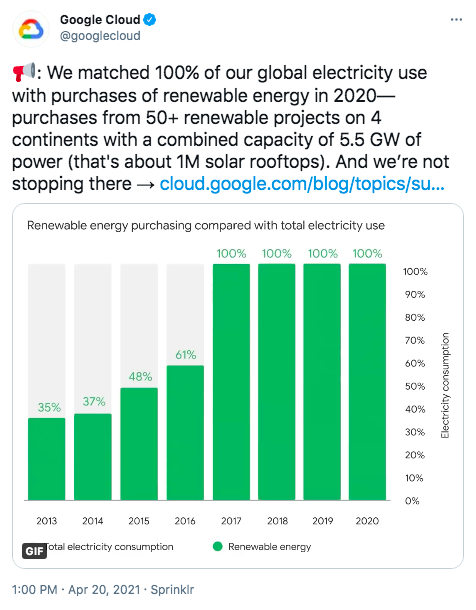It’s worth taking a moment to appreciate the sizzling feeling of momentum for climate ambition this week. Not long ago, not far away, Donald Trump was eyeing a second term and Joe Biden’s climate platform was underwhelming in the Democratic primaries. Europe was still pressing ahead, but the pandemic had hit and only the most stubbornly cheerful could imagine any global dynamism to address the climate emergency.
And yet, there we were on Thursday, with Biden, reborn as a climate hawk, clearly determined to galvanize action at home and around the world. Declaring “a moment of peril," Biden warned, “The signs are unmistakable. The science is undeniable. The cost of inaction keeps mounting."
Then he announced the U.S. would cut climate pollution at least 50 per cent this decade.
The next day, California’s governor announced he is phasing out oil extraction and banning fracking.
It isn’t just the U.S. showing momentum on climate. China committed to a peak and phase-down in coal burning. The European Union emerged from its long and tangled 27-country process with an agreement to make 55 per cent cuts this decade. Boris Johnson announced the U.K. would not only cut 68 per cent, as previously committed for 2030, but a whopping 78 per cent by 2035. It’s all starting to add up.
I’m not suggesting we get Pollyannaish in our moment of appreciation. But it’s worth recognizing how dramatically and how quickly things can change. How much elections can matter. How movements can drive leaders. Big changes can chug along forever and then happen at surprising speed.
The need for speed was underlined by the two very different categories of leaders’ speeches at the summit — the self-congratulatory, “rolling up our sleeves” tone of wealthy countries in stark contrast to leaders of vulnerable, developing countries describing the suffering their people are already facing.
We also shouldn’t get carried away by targets and promises. The countries of the world have met every year since the 1992 Earth Summit in Rio. Every year they meet, make solemn pledges and every year the climate emergency has gotten worse.
Canada has set lots of targets. We haven’t met any. We still don’t have a climate accountability system to address that pattern. We still drive the most polluting vehicles in the world. We still haven’t seen the long-promised Just Transition program for oil and gas workers. Or the much longer-promised elimination of fossil fuel subsidies.
Announcing a target isn’t the same as having a real plan. And those plans have to be made into laws and regulations. And those have to be turned into action.
“I will be blunt: commitments alone are not enough. We need real change in the real world. Right now, the data does not match the rhetoric,” Fatih Birol, the International Energy Agency’s executive director, told the summit.
U.S. momentum is big leverage in Canada
But for Canadians who want their governments to make big cuts, international momentum is major leverage. And that’s especially true for contrasts south of the border where they trigger Canada’s little sibling syndrome. Canadians believe Biden is serious on climate and desperately want to keep up.
Even before Biden was sworn in, the Canadian public was convinced he would make climate a major priority. Polling by Abacus in December found two-thirds of Canadians thought Biden would go big on climate.
And fully 77 per cent said they wanted Canada “to move our economy at a similar pace towards clean energy so we don’t become uncompetitive with the U.S. economy.” We’re very aligned on this point. Sixty-five per cent of Albertans and 59 per cent of Conservatives agree on the need to keep pace.
The Spotlight: Canada’s target is both deceptively weak and hard to meet
As I’m sure you’ve heard, Justin Trudeau pledged at the summit that Canada would cut emissions between 40 and 45 per cent by 2030.
That target was much lower than Canada’s “fair share” of the global task — climate groups had commissioned modelling for a 60 per cent cut.
Even so, 40 to 45 per cent doesn’t sound so far off the commitments made by the U.S. and other G7 countries. But there’s real trickery behind the numbers.
The biggest sleight of hand is that Canada doesn’t count its cuts from the same baseline year as other countries. We, and the U.S., use 2005 instead of 1990. (Try telling the CRA you’ll be calculating your taxes on income from July instead of January).
Translating all the G7 targets to 1990 so we can compare apples to apples without the baseline bullshittery makes an enormous difference:
Canada’s 40 per cent target translates into just 26 per cent. Not only are Canada’s emissions way out of line, our targets are, too.
New target will be tough
One thing that jumps out from that chart is how off-track Canada’s emissions are compared to our peers. They need to bend their curves more sharply. We need to take a hammer to ours.
By one good estimate, meeting the new target will require doubling the effort laid out in Canada’s enhanced climate plan last December.
That’s a pretty abstract way of conceptualizing the challenge. This week, the New York Times painted a more tangible picture: “Canada is the only G7 nation whose greenhouse gas emissions have increased since the Paris Agreement. The main reason: its oilsands.”
Justin Trudeau made the point (much more obliquely) in his address to the summit when he talked about the challenges of being an “energy-exporting nation.”
Different perspectives lead to different conclusions about this challenge. Catherine Abreu, the executive director of Climate Action Network Canada, comes at things from the standpoint of physics and climate justice:
“We really have to stop selling ourselves that perhaps comforting, but dangerous, lie that there is room for the oilsands in the future,” she told the Times.
Analysts focused on present-day economics and politics might agree the oilsands are “the emissions elephant in the room” but think it's unrealistic to phase them down. Andrew Leach is a professor from the University of Alberta who has helped design federal and provincial policies, and he’s sick of the whole debate over targets: “The world needs new and better policies, not target bingo.” He argues Canada already has stronger policies than the U.S. and much less low-hanging fruit for emissions cuts.
Canada has allowed surging emissions for so long that we’re now in a tough spot compared to some other wealthy countries. But bemoaning our lack of low-hanging fruit is pretty rich for a country driving the most polluting vehicles in the world. A country that’s still subsidizing fossil fuels and doesn’t have decent climate governance.
So, yes, our targets are tough, and not nearly tough enough. That’s the demanding nature of the race against climate change.
As Jennifer Granholm, the new (Vancouver-born) U.S. energy secretary told the summit: “Many are stuck in the status quo… insistent that we can’t reach our goals.
“We need a mindset that overcomes resistance to change.”
And now for some other items in the news.
The Roundup
Dalai Lama and 100 other Nobel prize winners call for a fossil fuel non-proliferation treaty
On the eve of the Biden climate summit, the Nobel prize winners released a joint letter declaring:
"The burning of fossil fuels is responsible for almost 80% of carbon dioxide emissions since the industrial revolution. Allowing the continued expansion of this industry is unconscionable."
The signatories won their Nobel prizes in physics, medicine, chemistry, economics, literature and peace. They’re calling for an international treaty that would immediately end the expansion into new reserves of coal, oil and natural gas. That would be followed by a phaseout of existing production, supported by funding to make the transition fair to workers and communities.

On the same day, Los Angeles — surely the capital of freeways and fast cars in the global imagination — became the first city in the U.S. to endorse a fossil fuel non-proliferation treaty.
The Nobel prize winners’ declaration was echoed in Xiye Bastida’s address to the Biden summit. One of this inspiring new generation of climate leaders, the 19-year-old is Otomi-Toltec and organizes with Fridays for Future. “The era of fossil fuels is over,” she told the assembled leaders. You can watch the speech here.
New York City sues Big Oil for lying to the public
Mayor Bill de Blasio had a unique Earth Day message: “See you in court.”

Net-zero banking alliance
Mark Carney is chairing a new initiative to align the financial sector with the goals of the Paris Agreement. Forty-three banks from 23 countries pledged to “set emissions targets within 18 months for 2030 and 2050, as well as intermediate targets every five years, that are consistent with assessment reports from the Intergovernmental Panel on Climate Change.”
There are good reasons to be skeptical of the standards set by these financial alliances. But it’s also worth noting that even under their current stringency, the only Canadian bank to join was Vancity — a credit union based in Vancouver. None of Canada’s big five signed up.
Alberta’s surge in big corporate renewables
“What do beer, banking and the world’s biggest online retailer now have in common?” asks Chris Varcoe in the Calgary Herald.
They’re all investing in renewable energy projects to supply themselves with clean power. Amazon and Labatt Breweries are the latest to sign multi-megawatt deals to build new solar plants in Alberta.
Rebecca Nadel, director of the Business Renewables Centre Canada, says this is just “the tip of the iceberg.” And she’s probably right — big companies putting up their own cash has been a major driver of fossil-free electricity.

Currently only Alberta has a flexible enough electricity system to allow companies to do this. Nova Scotia has been putting new rules in place and hopes to be ready later this year.
The Business Renewables Centre is now tracking corporate deals. So far, deals for 268MW have been announced just this year.

Climate change will cut $23 trillion out of the world economy by 2050
Who holds the bag when climate damages hit insurance companies? Well, insurance companies have insurance themselves. And one of the world’s biggest reinsurers says: “Climate change poses the biggest long-term risk to the global economy. No action is not an option.”
In a painfully common pattern, poorer countries that have done the least to cause the problem are going to suffer most. At two degrees, Malaysia, the Philippines and Thailand would have20 per cent less economic growth than without climate change.
But Swiss Re estimates we’re more likely headed to at least 2.6 degrees, in which case those countries’ growth would be cut almost in half. Indonesia would lose 40 per cent. India, 35 per cent.
Canada is much less vulnerable but will still be $100 billion poorer by 2050 if the world doesn’t work harder to fight climate change.
Banning gasoline cars
Washington state passed legislation that would phase out carbon-spewing passenger vehicles by 2030. That’s the earliest date yet in North America. California is going for 2035, the same year as Quebec. B.C. plans for 2040.
Meanwhile, 12 U.S. states urged Biden to phase out gas-powered vehicles by 2035. That’s for the kinds of cars and trucks you and I might drive. Heavy freight is a tougher problem, but according to Reuters, “the governors also want Biden to set standards and adopt incentives aimed at ensuring 100% zero-emission sales of medium-duty and heavy-duty vehicles by 2045.”
Honda became the latest automaker to announce it’s kicking gas. Honda is aiming for 40 per cent zero-emission vehicle sales in North America by 2030 on the way to phasing out combustion vehicles by 2040.
A new poll found that 63 per cent of European city dwellers want a ban on petrol and diesel cars. Not long ago, campaigns for these kinds of bans were treated as “fringe and crazy.” The Seattle Times has a fun profile on one of the stubborn optimists that just kept pushing in Washington state.
Not looking good for a green recovery
There was lots of talk about making the drop in climate pollution from the pandemic into a more structural, permanent decline. But the International Energy Agency now predicts we’re going to see the biggest annual increase in more than a decade — since the rebound after the Great Recession.
“This is a dire warning that the economic recovery from the COVID crisis is currently anything but sustainable for our climate," Fatih Birol, executive director of the IEA, told Reuters.
Canadian expat Corinne Le Quéré, who studies what makes certain countries successful in cutting greenhouse gas emissions, told the BBC: "As we have seen at the country-level in the past 15 years, the countries that succeed to cut their emissions are those where renewable energy replaces fossil energy.
"What seems to be happening now is that we have a massive deployment of renewable energy, which is good for tackling climate change, but this is occurring alongside massive investments in coal and gas.”
World’s top climate scientists
Speaking of Le Quéré, I’d like to leave you with a great feature piece this week. Reuters just mapped the most influential 1,000 climate researchers. Fewer than one in seven on the list are women. Here’s a powerful profile of a remarkable life, from Le Quéré’s botched effort to become a gym teacher in Gatineau (a botching for which we can all be grateful) through her struggles as a single mother doing cutting-edge work on the planet’s carbon cycles in a field dominated by men “of a certain age, of a certain type and very self-confident.”
Today, Le Quéré is a driving force in not just one but two of the world's best models of climate governance — the U.K. and France. She leads the French climate council and sits on the U.K.’s Climate Change Committee, which maps policies and targets for the five-year carbon budgets. See Reuters for more about Le Quéré.
That’s all for this week. Thank you for reading Zero Carbon. I know you have lots of outlets, media feeds, podcasts and newsletters to choose from. With your support, Canada’s National Observer will continue to drive the climate and energy conversation forward.
I’d love to hear from you: [email protected]. I can’t promise to answer every email but I do promise to read ‘em all.



